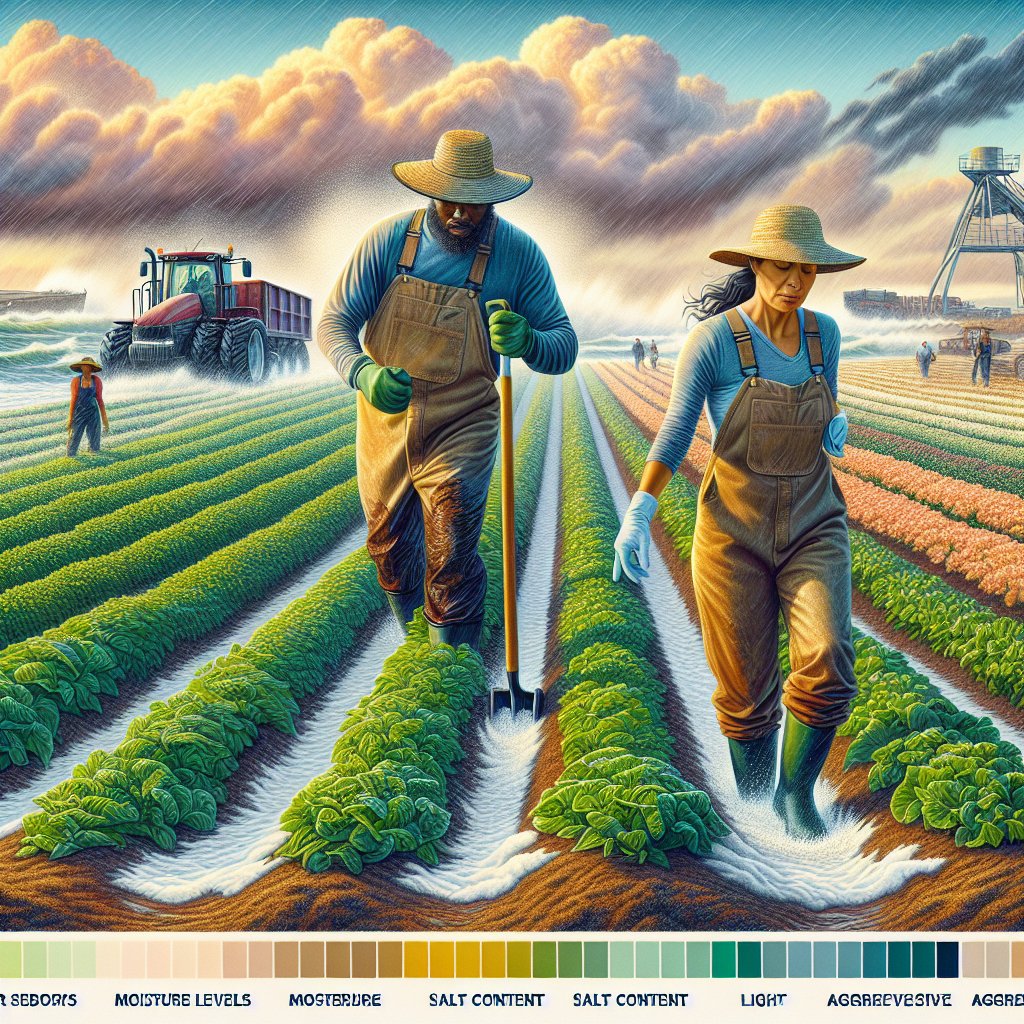Farming in coastal regions presents a unique set of challenges that can significantly impact agricultural productivity and sustainability. These areas, often characterized by their proximity to the ocean, face a variety of environmental factors that can complicate traditional farming practices. From saltwater intrusion to extreme weather events, farmers in coastal regions must navigate a complex landscape to ensure the viability of their crops and livestock.
Environmental Challenges
Coastal farming is heavily influenced by environmental factors that can pose significant challenges. One of the most pressing issues is saltwater intrusion, which occurs when seawater encroaches into freshwater aquifers. This phenomenon can be exacerbated by rising sea levels and increased storm surges, both of which are linked to climate change. As a result, the salinity of soil and water can increase, making it difficult for many crops to thrive.
In addition to saltwater intrusion, coastal regions are also susceptible to extreme weather events such as hurricanes, typhoons, and heavy rainfall. These events can lead to flooding, soil erosion, and damage to crops and infrastructure. Farmers must be prepared to adapt their practices to mitigate the impact of these unpredictable weather patterns. This may involve investing in more resilient crop varieties, improving drainage systems, or implementing soil conservation techniques.
Soil Management
Soil management is a critical aspect of farming in coastal regions. The unique composition of coastal soils, often influenced by the proximity to saltwater, requires careful management to maintain fertility and structure. Farmers may need to employ specific practices to counteract the effects of salinity, such as:
- Crop Rotation: Rotating crops can help improve soil health and reduce the buildup of salts in the soil.
- Cover Cropping: Planting cover crops during the off-season can help prevent erosion and improve soil structure.
- Organic Amendments: Adding organic matter, such as compost or manure, can enhance soil fertility and help buffer against salinity.
Moreover, the use of raised beds and contour farming can help manage water runoff and improve drainage, reducing the risk of waterlogging and salinity buildup. These practices not only enhance soil health but also contribute to the overall sustainability of coastal farming operations.
Economic and Social Challenges
Beyond environmental factors, farmers in coastal regions also face economic and social challenges that can impact their livelihoods. The high cost of land and competition for resources can make it difficult for farmers to maintain profitable operations. Additionally, coastal areas often attract tourism and development, which can lead to land use conflicts and increased pressure on agricultural land.
Access to markets is another critical issue for coastal farmers. Many coastal regions are remote, making it challenging to transport goods to larger markets. This can result in higher transportation costs and reduced profit margins. Farmers may need to explore alternative marketing strategies, such as direct-to-consumer sales or participation in local farmers’ markets, to improve their economic viability.
Community Support and Collaboration
Building a strong community network is essential for addressing the challenges faced by coastal farmers. Collaboration among farmers, local governments, and agricultural organizations can lead to the development of resources and support systems that benefit the entire community. Some strategies for fostering collaboration include:
- Cooperative Farming: Forming cooperatives can help farmers pool resources, share knowledge, and access larger markets.
- Educational Programs: Providing training and workshops on sustainable farming practices can empower farmers to adopt new techniques and improve their resilience.
- Advocacy: Engaging in advocacy efforts to promote policies that support coastal agriculture can help ensure that farmers’ voices are heard in decision-making processes.
By working together, coastal farmers can create a more sustainable and resilient agricultural system that can withstand the unique challenges of their environment.
Innovative Solutions for Coastal Farming
As the challenges of farming in coastal regions continue to evolve, innovative solutions are emerging to help farmers adapt and thrive. Technological advancements, sustainable practices, and research initiatives are playing a crucial role in addressing the unique needs of coastal agriculture.
Technological Advancements
Technology is transforming the way farmers approach their operations, providing tools and resources that can enhance productivity and sustainability. Some notable advancements include:
- Precision Agriculture: Utilizing GPS and data analytics, farmers can monitor soil conditions, crop health, and water usage more effectively. This allows for targeted interventions that can improve yields and reduce waste.
- Salt-Tolerant Crops: Research into developing salt-tolerant crop varieties is ongoing, providing farmers with options that can withstand higher salinity levels.




